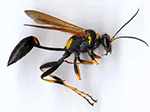 They are known for their distinct body shape, with a narrow waist and often vibrant colors. Wasps are a diverse group of insects that can be categorized into two main groups: solitary wasps and social wasps.
They are known for their distinct body shape, with a narrow waist and often vibrant colors. Wasps are a diverse group of insects that can be categorized into two main groups: solitary wasps and social wasps.
Here are some key points about wasps:
- Solitary Wasps: Many wasp species are solitary, meaning they live and hunt alone rather than in colonies. Solitary wasps construct nests for their offspring, providing them with provisions before sealing the nest. Examples of solitary wasps include mud daubers, potter wasps, and spider wasps.
- Social Wasps: Social wasps, like yellow jackets and paper wasps, live in colonies with a hierarchical structure similar to honey bees. A social wasp colony typically consists of a queen, sterile female workers, and male drones. Social wasps construct nests using paper-like material made from chewed wood fibers mixed with saliva.
- Stinging Behavior: Wasps are known for their ability to sting. They have a stinger at the end of their abdomen, which can deliver a painful sting that contains venom. Unlike honey bees, which can only sting once due to their barbed stingers, most wasps can sting multiple times.
- Predatory Behavior: Many wasp species are predators and feed on other insects, including caterpillars, flies, and other small creatures. Some solitary wasps paralyze their prey and lay eggs on or near the immobilized victim. The developing wasp larvae then feed on the paralyzed prey.
- Pollination: While wasps are not as effective at pollination as bees, some species do play a role in pollinating certain plants. They may inadvertently carry pollen from one flower to another as they visit flowers in search of nectar.
- Nest Construction: Social wasps construct nests from a mixture of wood fibers and saliva, creating a paper-like material. The nests can vary in size and shape, and they are often located in sheltered areas like under eaves, in tree hollows, or in the ground.
- Beneficial and Pest Control: Despite their reputation as pests due to their stinging behavior, wasps can also be beneficial to ecosystems and agriculture. They help control pest insect populations by preying on them, contributing to natural pest control.
- Interactions with Humans: Some species of wasps can be considered pests when they build nests in or near human-occupied areas. Aggressive behaviors and painful stings can lead to negative interactions with people, especially during outdoor activities.
It’s important to note that not all wasp species are aggressive, and they play a role in maintaining the balance of ecosystems. Just like with other insects, understanding and respecting their behavior can help mitigate conflicts while appreciating their ecological significance.
If you are seeing an increase in bee or wasp activity around your home, call the experts at Universal Pest Services (610)449-0740 and schedule a free inspection today!